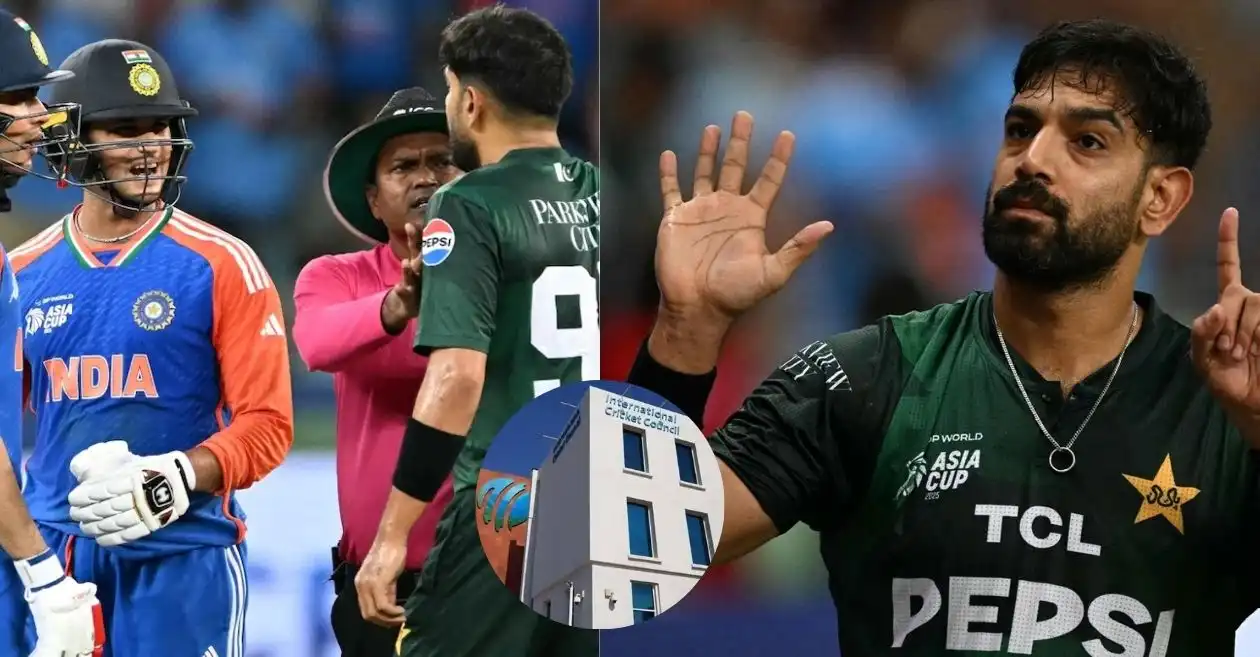Few rivalries in world sport evoke the same passion, intensity, and emotional energy as India vs Pakistan cricket. The contests are not just games—they are events that grip millions across the globe, carrying history, politics, and national pride into every ball delivered and every run scored.
The Asia Cup 2025, being played in the UAE, was no exception. When India and Pakistan clashed in the Super 4s on September 21 at the Dubai International Stadium, the on-field drama quickly spilled into controversy. While fans witnessed thrilling cricket, the match’s aftermath has been dominated by off-field debates, disciplinary hearings, and official action from the International Cricket Council (ICC).
The governing body has now confirmed sanctions against multiple players, including Haris Rauf, Sahibzada Farhan, and India’s captain Suryakumar Yadav, for gestures and remarks deemed provocative, insensitive, or outside the spirit of the game.
This episode has once again highlighted the fine line between passion and provocation in cricket’s fiercest rivalry.
Haris Rauf in the Eye of the Storm
The biggest penalty was handed to Haris Rauf, Pakistan’s fiery pacer. Known for his raw pace and aggressive celebrations, Rauf crossed the ICC’s disciplinary threshold during the India clash.
What exactly happened?
-
After being taunted with chants of “Kohli, Kohli” from Indian fans—a reference to Virat Kohli’s iconic sixes against him in the 2022 T20 World Cup—Rauf reacted with a set of gestures.
-
Cameras caught him mimicking a crashing plane followed by flashing a “6-0” sign with his fingers.
-
The imagery was interpreted as politically charged and mocking, invoking memories of a sensitive military standoff between the two nations.
The ICC’s verdict
The Board of Control for Cricket in India (BCCI) lodged a formal complaint after the match, presenting video evidence of Rauf’s antics. A hearing was held with ICC match referee Richie Richardson presiding.
-
Rauf pleaded not guilty, arguing that his actions were “spontaneous responses” to the crowd noise.
-
The ICC, however, found him guilty of breaching Article 2.6 of the Code of Conduct, which covers “using gestures or language that is obscene, offensive or of a personal nature.”
-
Rauf was fined 30% of his match fees, a significant financial penalty, but escaped suspension.
While Pakistan’s cricket board publicly backed their player, Indian officials welcomed the ruling, saying it sent a “clear message that political references and offensive gestures have no place on the cricket field.”
Sahibzada Farhan’s Gun Celebration: Culture or Controversy?
If Rauf’s actions were controversial, Sahibzada Farhan’s half-century celebration lit another fire.
The incident
-
After reaching 50 in style, Farhan raised his bat and mimicked the firing of a machine gun.
-
The gesture was instantly polarizing: while some fans found it entertaining, many condemned it as insensitive and provocative, particularly in a region scarred by conflict.
The ICC’s decision
The ICC stopped short of fining Farhan but handed him an official reprimand and warning.
Farhan defended himself, stating:
“It was a spontaneous moment, a gesture that is part of my tribal Pashtun cultural celebrations. It was never meant to hurt anyone.”
Still, the ICC ruled that even cultural or personal expressions must not cross boundaries in high-stakes international matches, where global audiences interpret gestures through a broader lens.
For Farhan, the warning serves as both a reminder and a caution. While no financial penalty was imposed, repeated breaches could attract heavier consequences.
Suryakumar Yadav Also Pulled Up
The controversy did not remain one-sided. The Pakistan Cricket Board (PCB) filed its own complaint against Suryakumar Yadav, India’s captain.
The remarks in question
Following India’s earlier group-stage victory over Pakistan, Suryakumar dedicated the win to:
-
The Indian Armed Forces involved in “Operation Sindoor,” and
-
The victims of the Pahalgam terror attack in Jammu and Kashmir.
While the comments resonated deeply with Indian fans, the PCB argued that such statements were “political in nature”, breaching the ICC’s guidelines which prohibit bringing political or military references into cricket.
The ICC’s ruling
After reviewing the comments, the ICC concluded that while Suryakumar’s intentions may have been rooted in empathy, his words strayed into territory that cricket’s global body seeks to avoid.
-
He was issued a formal warning and advised to refrain from making political references in future.
-
No fines or suspensions were imposed, but the warning remains on record.
This decision has been viewed as a balancing act by the ICC—acknowledging the PCB’s concerns while also recognizing the sensitive nature of Suryakumar’s comments.
The ICC’s Balancing Act
The ICC’s disciplinary decisions underline its broader goal: keeping cricket focused on the sport itself, even in rivalries as charged as India vs Pakistan.
In its official statement, the ICC noted:
“The Code of Conduct exists to uphold the spirit of cricket. While passion is inevitable, players must remain mindful of the global platform and the impact of their actions and words.”
By penalizing Rauf, reprimanding Farhan, and warning Suryakumar, the ICC sought to draw clear lines without escalating tensions further.
The BCCI and PCB Reactions
Unsurprisingly, the two boards reacted differently.
-
BCCI officials expressed satisfaction, particularly with the action against Rauf. “Our players have always upheld the dignity of the game. We welcome the ICC’s swift action,” one senior BCCI executive was quoted.
-
PCB sources, meanwhile, expressed disappointment, especially at Rauf’s fine. “Crowds provoked our players too, but that context wasn’t considered enough,” a PCB spokesperson told local media.
The fact that both boards saw wins and losses in the verdict shows how contentious the rivalry remains.
The Larger Context: Cricket and Politics
The controversy highlights once again how cricket between India and Pakistan often straddles the line between sport and politics.
-
Crowd provocations: Chants like “Kohli, Kohli” were designed to rile Rauf, and his response proved the bait worked.
-
Player expressions: From Farhan’s celebratory gun mimic to Suryakumar’s dedication to security forces, each act carried meanings beyond cricket.
-
Historical baggage: Decades of political disputes inevitably color interpretations of even innocent gestures.
For the ICC, the task is unenviable: how to allow raw passion in cricket’s fiercest rivalry without letting it slide into hostility or politicization.
Player Reactions and Social Media Buzz
As always, social media exploded:
-
Indian fans widely circulated videos of Rauf’s gestures, demanding punishment.
-
Pakistani fans defended their pacer, arguing he was unfairly targeted for crowd provocation.
-
Farhan’s gun celebration trended under hashtags like #FarhanCelebration and #NotAGunButABat, sparking debates on cultural expression vs insensitivity.
-
Suryakumar received support at home but criticism abroad for “mixing politics with cricket.”
Former cricketers also weighed in:
-
Irfan Pathan called Rauf’s antics “classless aggression.”
-
Waqar Younis defended Pakistani players, urging ICC to “also protect players from hostile crowds.”
-
Harbhajan Singh praised the ICC for “acting quickly to maintain dignity.”
The Spirit of the Game at Stake
The episode serves as a reminder of why the “Spirit of Cricket” clause exists. Cricket is unique in how it emphasizes sportsmanship alongside competition. Yet, in matches like India vs Pakistan, where emotions run sky-high, that spirit is constantly tested.
Gill’s sharp catch, Abhishek Sharma’s fearless batting, Bumrah’s skill with the ball—these should have been the lasting memories of the match. Instead, gestures and words overshadowed the cricket.
What Happens Next?
The ICC’s rulings close this chapter but leave open questions:
-
Will players on both sides tone down their gestures in the final?
-
Can boards work together to sensitize players on boundaries of acceptable celebrations?
-
Will crowd behavior be addressed more strongly, given it often triggers player reactions?
With the India vs Pakistan final on the horizon, the stakes are even higher. All eyes will be on not just the cricketing skills but also the conduct of players under pressure.
The Asia Cup 2025 Super 4 clash between India and Pakistan was always going to be heated. While the cricket lived up to its billing, the post-match fallout showed how easily sporting rivalries can tip into controversy.
By fining Haris Rauf, reprimanding Sahibzada Farhan, and warning Suryakumar Yadav, the ICC has attempted to draw a clear line: passion is welcome, provocation is not.
For fans, the hope remains that the upcoming final between India and Pakistan will be remembered not for controversies but for cricketing excellence—the kind that inspires, unites, and celebrates the sport’s true spirit.
Please check for information on the best betting sites in India – https://selectory.org/best-betting-sites/















